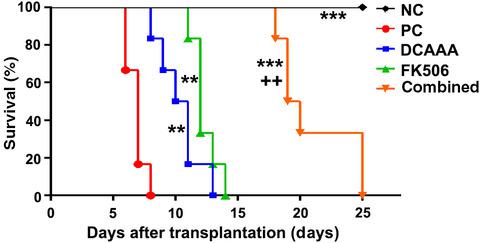当前位置:
X-MOL 学术
›
Immunol. Cell Biol.
›
论文详情
Our official English website, www.x-mol.net, welcomes your feedback! (Note: you will need to create a separate account there.)
Combination of N, N′‐dicyclohexyl‐N‐arachidonic acylurea and tacrolimus prolongs cardiac allograft survival in mice
Immunology and Cell Biology ( IF 4 ) Pub Date : 2020-03-12 , DOI: 10.1111/imcb.12327 Ke An 1 , Qing Qin 2 , Shengnan Yu 3 , Mengjiao Xue 1 , Zhenzhen Wang 1 , Qingru Lin 1 , Yunhan Ma 1 , Guoliang Yan 1 , Sirui Mo 4 , Yingyu Chen 1 , Liyi Zhang 1 , Jiaying Zhong 1 , Zhongquan Qi 5 , Junjie Xia 1
Immunology and Cell Biology ( IF 4 ) Pub Date : 2020-03-12 , DOI: 10.1111/imcb.12327 Ke An 1 , Qing Qin 2 , Shengnan Yu 3 , Mengjiao Xue 1 , Zhenzhen Wang 1 , Qingru Lin 1 , Yunhan Ma 1 , Guoliang Yan 1 , Sirui Mo 4 , Yingyu Chen 1 , Liyi Zhang 1 , Jiaying Zhong 1 , Zhongquan Qi 5 , Junjie Xia 1
Affiliation

|
Current immunosuppressive agents for organ transplantation are not ideal because of their strong toxicity and adverse effects. Hence, there is an urgent need to develop novel immunosuppressive agents. The compound N, N′‐dicyclohexyl‐N‐arachidonic acylurea (DCAAA) is a novel highly unsaturated fatty acid from the traditional Chinese medicinal plant Radix Isatidis. In this study, we systematically investigated the toxicity, immunosuppressive effect and mechanisms underlying the activity of DCAAA. The toxicity tests showed that DCAAA treatment did not lead to red blood cell hemolysis and did not affect the liver and kidney functions in mice. The lymphocyte transformation test showed that DCAAA treatment inhibited lymphocyte proliferation in a dose‐dependent manner. An in vivo cardiac allotransplantation experiment showed that DCAAA treatment could suppress the immune rejection and significantly prolong the survival of cardiac allografts in recipient mice by reducing the proportion of CD4+ T cells in the spleen and grafts, concentration of interferon‐γ in the supernatant and serum and infiltration of inflammatory cells into the grafts. Moreover, a combination treatment with DCAAA and tacrolimus had a synergistic effect in preventing acute rejection of heart transplants. In vitro molecular biology experiments showed that DCAAA treatment inhibited activation of the T‐cell receptor‐mediated phosphoinostide 3‐kinase‐protein kinase B pathway, thereby arresting cell cycle transition from the G1 to the S phase, and inhibiting lymphocyte proliferation. Overall, our study reveals a novel, low‐toxicity immunosuppressive agent that has the potential to reduce the toxic side effects of existing immunosuppressive agents when used in combination with them.
中文翻译:

N,N'-二环己基-N-花生四烯酸酰脲和他克莫司的组合延长了小鼠的心脏同种异体移植存活时间
当前的用于器官移植的免疫抑制剂由于其强毒性和不利作用而并不理想。因此,迫切需要开发新型的免疫抑制剂。化合物N,N'-二环己基-N-花生四烯酸酰脲(DCAAA)是来自传统中草药植物板蓝根的新型高度不饱和脂肪酸。在这项研究中,我们系统地研究了DCAAA活性的毒性,免疫抑制作用和机制。毒性试验表明,DCAAA处理不会导致红细胞溶血,也不会影响小鼠的肝肾功能。淋巴细胞转化试验表明,DCAAA处理以剂量依赖性方式抑制淋巴细胞增殖。一个体内的心脏同种异体移植实验表明,DCAAA治疗可以抑制免疫排斥反应,并通过降低CD4的比例显著延长受体小鼠移植心脏存活+脾脏和移植物中的T细胞,上清液和血清中干扰素γ的浓度以及炎症细胞向移植物中的浸润。此外,DCAAA和他克莫司的联合治疗在预防心脏移植急性排斥反应中具有协同作用。体外分子生物学实验表明,DCAAA处理可抑制T细胞受体介导的磷酸肌醇3-激酶-蛋白激酶B通路的激活,从而阻止细胞周期从G 1过渡到S期,并抑制淋巴细胞增殖。总体而言,我们的研究揭示了一种新型的低毒性免疫抑制剂,与它们结合使用时,具有降低现有免疫抑制剂毒性副作用的潜力。
更新日期:2020-03-12
中文翻译:

N,N'-二环己基-N-花生四烯酸酰脲和他克莫司的组合延长了小鼠的心脏同种异体移植存活时间
当前的用于器官移植的免疫抑制剂由于其强毒性和不利作用而并不理想。因此,迫切需要开发新型的免疫抑制剂。化合物N,N'-二环己基-N-花生四烯酸酰脲(DCAAA)是来自传统中草药植物板蓝根的新型高度不饱和脂肪酸。在这项研究中,我们系统地研究了DCAAA活性的毒性,免疫抑制作用和机制。毒性试验表明,DCAAA处理不会导致红细胞溶血,也不会影响小鼠的肝肾功能。淋巴细胞转化试验表明,DCAAA处理以剂量依赖性方式抑制淋巴细胞增殖。一个体内的心脏同种异体移植实验表明,DCAAA治疗可以抑制免疫排斥反应,并通过降低CD4的比例显著延长受体小鼠移植心脏存活+脾脏和移植物中的T细胞,上清液和血清中干扰素γ的浓度以及炎症细胞向移植物中的浸润。此外,DCAAA和他克莫司的联合治疗在预防心脏移植急性排斥反应中具有协同作用。体外分子生物学实验表明,DCAAA处理可抑制T细胞受体介导的磷酸肌醇3-激酶-蛋白激酶B通路的激活,从而阻止细胞周期从G 1过渡到S期,并抑制淋巴细胞增殖。总体而言,我们的研究揭示了一种新型的低毒性免疫抑制剂,与它们结合使用时,具有降低现有免疫抑制剂毒性副作用的潜力。



























 京公网安备 11010802027423号
京公网安备 11010802027423号